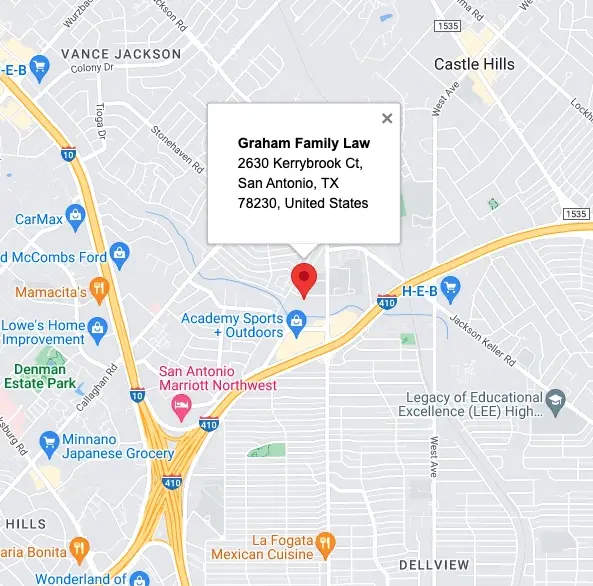- Home
- About
- Attorneys
- Practice Areas
- Divorce
- 10 Signs Your Wife May Be Planning to Divorce You and What You Can Do to Avoid Losing Everything
- How to Protect Yourself and Your Assets in a Contentious Divorce in San Antonio, TX
- Can My Wife Ask Me to Leave My House After She Files for Divorce?
- Will My Wife Keep Military Benefits After the Divorce Is Final?
- Child Custody
- Child Support
- Child Protective Services
- Adoptions
- Family Law
- Texas Military Family Lawyer
- SAPCR Law in San Antonio
- Prenuptial and Postnuptial Agreements
- Visitation
- Divorce
- Blog
- A Guide to the Divorce Process in Texas
- When Dad has had Enough
- How Much Child Support Is the Max Amount In Texas?
- Do You Still Pay Child Support with 50/50 Custody in Texas? Discover the Facts
- Can My Wife Ask Me to Leave My House After She Files for Divorce?
- My spouse moved out with the children without notice – what do I do now?
- 10 Signs Your Wife May Be Planning to Divorce You and What You Can Do to Avoid Losing Everything
- Blog Archives
- Payments
- Home
- About
- Attorneys
- Practice Areas
- Divorce
- 10 Signs Your Wife May Be Planning to Divorce You and What You Can Do to Avoid Losing Everything
- How to Protect Yourself and Your Assets in a Contentious Divorce in San Antonio, TX
- Can My Wife Ask Me to Leave My House After She Files for Divorce?
- Will My Wife Keep Military Benefits After the Divorce Is Final?
- Child Custody
- Child Support
- Child Protective Services
- Adoptions
- Family Law
- Texas Military Family Lawyer
- SAPCR Law in San Antonio
- Prenuptial and Postnuptial Agreements
- Visitation
- Divorce
- Blog
- A Guide to the Divorce Process in Texas
- When Dad has had Enough
- How Much Child Support Is the Max Amount In Texas?
- Do You Still Pay Child Support with 50/50 Custody in Texas? Discover the Facts
- Can My Wife Ask Me to Leave My House After She Files for Divorce?
- My spouse moved out with the children without notice – what do I do now?
- 10 Signs Your Wife May Be Planning to Divorce You and What You Can Do to Avoid Losing Everything
- Blog Archives
- Payments
CALL NOW! 210-308-6448


